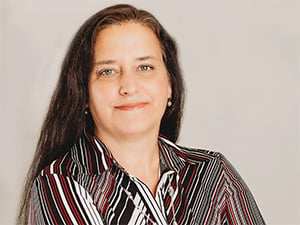Five questions with Hayla Sluss, PhD'98
 Hayla Sluss, PhD'98, is an assistant professor in the Division of Endocrinology, Diabetes, and Metabolism at UMass Chan Medical School. Her lab studies the role of stress signaling in cancer, diabetes and other chronic illnesses, as well as the pathology of post-infection-associated disease in adult and pediatric patients.
Hayla Sluss, PhD'98, is an assistant professor in the Division of Endocrinology, Diabetes, and Metabolism at UMass Chan Medical School. Her lab studies the role of stress signaling in cancer, diabetes and other chronic illnesses, as well as the pathology of post-infection-associated disease in adult and pediatric patients.
1. As both a UMass Chan graduate and faculty member, can you tell us one thing that’s special about the Medical School?
One aspect that truly stands out about UMass Chan Medical School is its commitment to fostering a holistic and collaborative research environment. As both a graduate and a faculty member, I've experienced firsthand how this supportive culture not only nurtures academic excellence but also encourages interdisciplinary approaches. I have seen direct action to address inclusion and dignity in the workplace. This environment was instrumental in shaping my own research in chronic and infection-associated illnesses, allowing me to integrate my expertise in cancer biology and diabetes in innovative ways.
2. It’s been said that we’re living in a “golden age of biomedical research.” Do you agree with this? What makes you hopeful about the future of biomedical research?
Absolutely. We are traversing a remarkable era in biomedical research, a true golden age. The rapid advancements in omics technologies, 3D modeling, the application of personalized medicine coupled with a heightened focus on the social determinants of health are fundamentally reshaping our approach to medical treatment. My optimism is fueled by the expanding comprehension of complex diseases like Myalgic encephalomyelitis/chronic fatigue syndrome (ME/CFS), long COVID and long Lyme disease, a field where my own lived experience has inspired my research. This period is characterized by an extraordinary synergy of cutting-edge technology, cross-disciplinary collaboration and an enriched understanding of disease mechanisms, all converging to herald a new frontier of transformative innovations in health care. My hopes for the future are when we no longer say to patients, “We can't help you because we don't understand this disease.”
3. What’s been one of the most exciting or memorable moments in your research career?
Throughout my research career, I've been privileged to experience numerous memorable moments, spanning from personal breakthroughs to witnessing the extraordinary achievements of my colleagues. One highlight was my involvement in the pioneering work that characterized proteins regulating the cell cycle, a foundational step in the development of cancer treatments. However, the most consistently thrilling aspect for me lies in the journey of scientific discovery itself: from the initial spark of formulating a research question, through the intricate process of designing and executing experiments, to the exhilarating moment of witnessing the results come to life. The true privilege and lasting memory for me is in the fortunate opportunity to engage in this enriching and transformative process of scientific inquiry.
4. Why do you give to UMass Chan? And why is support from donors, such as alumni like you, important?
I am deeply committed to the university because I've seen it transform into a holistic place of work. It's a supportive, collegial and diverse environment that encourages mutual support and academic excellence. My contributions, whether through research endeavors or mentoring young scientists, are my way of giving back to an institution that values concrete action and progressive thinking. I envision a future where our collaborative efforts lead to significant advancements in health care, particularly for chronic and infection-related illnesses. Support from alumni ensures UMass Chan succeeds in its efforts to be a place of great teaching and advancement in research, with a backdrop of personal dignity for all.
5. What’s your favorite way to spend a day off?
On my days off, I enjoy activities that allow me to relax and recharge. This often involves spending time with family or being outdoors, whether it's walking a nature trail or simply enjoying a quiet day in. These moments of boisterous Brazilian family time or outdoor tranquility provide me with a much-needed break from the fast-paced world of research.

